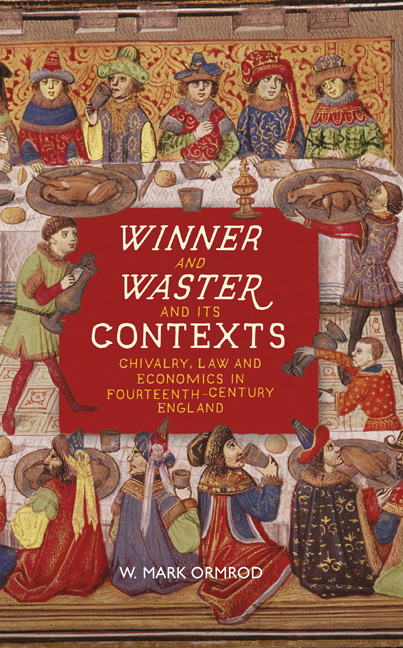Book contents
- Frontmatter
- Contents
- Acknowledgements
- Note on Editions
- List of Abbreviations
- Introduction: Winner and Waster: A Poem on the Times
- 1 Chivalry and Internationalism: The Garter Feast of 1358 and English Diplomacy during the 1350s and 1360s
- 2 Treason, Public Order and Dispute Settlement: The Statute of Treasons of 1352 and Royal Arbitration
- 3 Landed Society, Conspicuous Consumption and the Political Economy: The Sumptuary Laws of 1363
- 4 The Private and the Public Spheres: The Royal Household and State Finance under Edward III
- 5 Satire, Complaint and Authorship: Winner and Waster and the Alliterative Revival of the Fourteenth Century
- 6 Winner and Waster: Timeliness and Timelessness
- Appendix 1 Timeline, 1337–70
- Appendix 2 A Modern English Version of Winner and Waster
- Bibliography
- Index
- Publisher̕s Note
2 - Treason, Public Order and Dispute Settlement: The Statute of Treasons of 1352 and Royal Arbitration
Published online by Cambridge University Press: 09 April 2021
- Frontmatter
- Contents
- Acknowledgements
- Note on Editions
- List of Abbreviations
- Introduction: Winner and Waster: A Poem on the Times
- 1 Chivalry and Internationalism: The Garter Feast of 1358 and English Diplomacy during the 1350s and 1360s
- 2 Treason, Public Order and Dispute Settlement: The Statute of Treasons of 1352 and Royal Arbitration
- 3 Landed Society, Conspicuous Consumption and the Political Economy: The Sumptuary Laws of 1363
- 4 The Private and the Public Spheres: The Royal Household and State Finance under Edward III
- 5 Satire, Complaint and Authorship: Winner and Waster and the Alliterative Revival of the Fourteenth Century
- 6 Winner and Waster: Timeliness and Timelessness
- Appendix 1 Timeline, 1337–70
- Appendix 2 A Modern English Version of Winner and Waster
- Bibliography
- Index
- Publisher̕s Note
Summary
The aim of this chapter is to demonstrate the fallibility of two previously central arguments in the dating and interpretation of W&W: first, that the poem explicitly references the Statute of Treasons of 1352; and secondly that it commemorates the Black Prince's eyre (judicial visitation) of Cheshire in 1353. More generally, the chapter calls into question the degree to which the poet was concerned with more general issues of public order, and instead emphasises the particular challenges created by the desire of landed society to take matters into its own hands and resolve disputes through armed force. Seeing the ‘trial’ of Wynnere and Wastoure not as a formal judicial process with a plaintiff and a defendant, but rather as a form of royal arbitration between two equally matched (and equally implicated) protagonists, allows a more general discussion of Edward III's record and achievement in provid¬ing informal dispute resolution between his high-status subjects. As in the previous chapter, so in this: a reading of W&W that assumes a composition in the later 1350s or the 1360s allows us to move away from the sometimes reductive nature of previous historicist scholarship on the poem and to offer a new range of possible allusions to contemporary events and controversies surrounding the rule of law.
Early in the poem, we are told that the great assembly gathered before the king includes the forces of two rivals who have already technically bro¬ken the king's peace by unfurling their banners in a state of private war:
In aythere holte was ane here in hawberkes full brighte,
Harde hates appon hedes and helmys with crestys;
Brayden owte appon thaire baners bown for to mete;
Schowen owte of the schawes in schiltrons they felle
And bot the lengthe of a launde theis lordes bytwene.
(lines 50–4)(On either side were two armies in bright hauberks,
Hard hats on their heads, and helmets with crests;
Their banners were unfurled and lowered ready to meet;
Rushing out of the woods, they formed up in phalanxes;
There was only the length of a laund between these lords.)
- Type
- Chapter
- Information
- Winner and Waster and its ContextsChivalry, Law and Economics in Fourteenth-Century England, pp. 39 - 60Publisher: Boydell & BrewerPrint publication year: 2021



